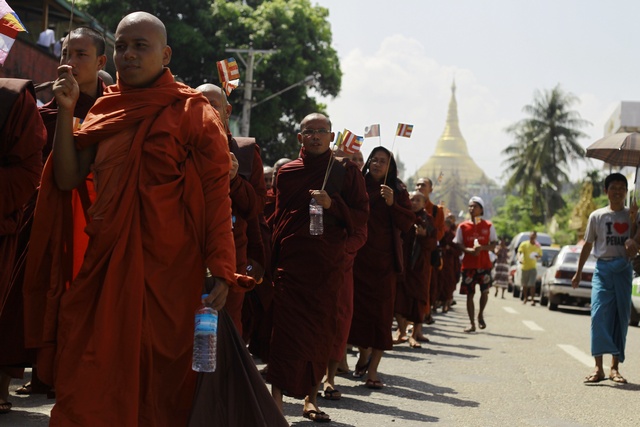July was a good month for the Association for the Protection of Race and Religion (commonly known by its Burmese-language acronym Ma–Ba–Tha). Formed in the aftermath of deadly interreligious violence in Arakan State in 2012, this group of nationalist monks has been a fixture in the Burmese political scene as the country has struggled to sustain momentum in its ongoing democratic transition.
Along with associated Buddhist-extremist group 969, the Ma-Ba-Tha’s main contribution to the political debate since its formation has been its effective fomentation of anti-Muslim sentiment nationwide. At the helm of the movement is prominent monk Wirathu, famed for his rabid anti-Muslim tirades, who has amassed a sizable following as the group has ratcheted up its xenophobic rhetoric.
While Buddhist monks are constitutionally barred from voting in Burma, they still wield immense political influence in the conservative majority-Buddhist country. In scoring two major victories on 7 July, the Ma-Ba-Tha made clear its capacity to influence Burmese politics as the 2015 general election approaches.
The first of these victories was the Burmese parliament’s decision to pass the Buddhist Women’s Special Marriage Bill, a law which restricts a Buddhist woman’s ability to marry a man of another religion, and requires interfaith couples to seek permission from local authorities in order to wed.
The Ma-Ba-Tha had been promoting this bill for years as part of a series of legislation, officially termed the ‘Race and Religion Protection Laws’, designed to “protect” the status of Buddhism in Burma. Earlier this year, the Population Control Health Bill also passed, stipulating women must wait three years in between births.

Despite outcry from prominent international voices denouncing the Marriage Bill as an affront to women’s and minority rights, the bill was passed by an overwhelming margin—524 votes to just 44 in parliament. The lopsided tally demonstrated that few national politicians are willing to cross the powerful Ma-Ba-Tha lobby on issues the Buddhist coalition views as its core priorities.
The Ma-Ba-Tha secured its second major victory when the government signed an order backing down from plans to build a series of new high-rise developments near the revered Shwedagon Pagoda in Rangoon.
In the preceding months, the Ma-Ba-Tha had led the charge against the projects, which critics argued would obstruct views of the famed pagoda and possibly disrupt the foundations of the sacred site. Just before their cancellation, Ma-Ba-Tha had threatened to lead nationwide protests if the government moved ahead with the development project.
Authorities in February had temporarily suspended the projects, but until recently they had been hesitant to scuttle plans entirely, having already inked agreements with developers. The ultimate decision to cancel them for good after the Ma-Ba-Tha began their aggressive ‘Save the Shwedagon’ campaign therefore proved to be an impressive achievement for the hardline monks.
The political dynamics behind these recent victories are complex. Despite its leaders’ claims of political independence, many observers and activists contend that the Ma-Ba-Tha’s real strength comes, in large part, from a mutually beneficial working relationship with the current government.
Indeed, despite the group’s odious international profile as a xenophobic collection of “mad monks,” the ruling Union Solidarity and Development Party (USDP) has effectively embraced it. Government officials have, for the most part, looked the other way when Ma-Ba-Tha leaders have engaged in divisive hate speech against Muslims in Burma, allowing this type of rhetoric to proliferate, while cracking down on individuals accused of “insulting” Buddhism.
In return, the USDP has benefited thus far from Ma-Ba-Tha’s presence in the political scene. Despite the fact that monks are generally supposed to remain above the fray of electoral politics, one Ma-Ba-Tha leader flat out told fellow members at a recent gathering in Rangoon to rally support for the ruling party ahead of elections this November.
Beyond such direct support, the Ma-Ba-Tha’s rhetoric and actions have also yielded the added bonus of heightened religious tensions, which stir up divisive nationalist sentiment that threatens to undermine opposition parties, including the National League for Democracy – the USDP’s biggest rival in elections this November.
But the cancellation of the Dagon City real estate venture represents a harbinger of potential problems for the future of this presently productive relationship. The campaign, the Ma-Ba-Tha’s first targeting development projects rather than the country’s vulnerable Muslim minority, proved that the monks have their own broader agenda.
[related]
In many ways, the ‘Save the Shwedagon’ campaign was a test of the Ma-Ba-Tha’s true political heft. Getting the government to buy into a scheme to further restrict the rights of an already persecuted minority was relatively easy. But getting an administration, which has made economic development its key priority, to backtrack on firm commitments to developers was a much heavier lift.
Government leaders, whose tacit support (or at the very least, it’s hands-off approach) has allowed the Ma-Ba-Tha to amass a sizeable public following, are likely operating under the belief that the group would remain focused on pushing for anti-Muslim policies that they had no problem enacting.
But by enabling the group’s rise, the ruling party may have unwittingly created a monster it cannot so easily control.
As Ma-Ba-Tha leaders flex their political muscles, more dramatic policy clashes with the current government could arise. Future governments, too, will have to contend with this powerful and increasingly unpredictable political force.
Oren Samet is an independent journalist and researcher based in Bangkok.
The views expressed in this article are the author’s and do not reflect DVB editorial policy.
More by Oren Samet: The shape of polls to come



